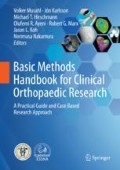Abstract
Although randomized controlled trials (RCTs) are often assigned the highest level of evidence within the EBM framework, not all RCTs are conducted the same way and consequently the results should be carefully scrutinized. Conclusions from RCTs are influenced by many potential confounding factors such as sample sizes, blinding, bias, statistical analysis, as well as the potential of type 1 error. Expert opinion and other level 5 methods are often seen as the first step in the evidence-based medicine hierarchy framework, from which more robust, comprehensive evidence-based medicine may be generated. By using expert opinion and consensus statements to develop an evidence base, practitioners can move beyond relying on their own experience and can avail on an accumulated experience of a larger cohort of practitioners in their respective field. Level 5 evidence may also facilitate the development of clinical practice guidelines or in assisting healthcare stakeholders with decision making, thus highlighting opportunities and areas for future research. Although at the lower end of the evidence-based medicine hierarchy, level 5 evidence methods have the added advantage of being feasible with limited resources where it may not be feasible to carry out randomized controlled trials, population surveys, or cohort studies.
Access this chapter
Tax calculation will be finalised at checkout
Purchases are for personal use only
References
Green LW. Making research relevant: if it is an evidence-based practice, where’s the practice-based evidence? Fam Pract. 2008;25(Suppl 1):20–4.
Minas H, Jorm AFO. Where there is no evidence: use of expert consensus methods to fill the evidence gap in low-income countries and cultural minorities. Int J Ment Health Syst. 2010;4:33. https://doi.org/10.1186/1752-4458-4-33.
Levine G, Jeong Y, Goto S, Anderson J, Huo Y, Mega J, Taubert K, Smith S. Expert consensus document: World Heart Federation expert consensus statement on antiplatelet therapy in East Asian patients with ACS or undergoing PCI. Nat Rev Cardiol. 2014;11(10):597–606. https://doi.org/10.1038/nrcardio.2014.104. Epub 2014 Aug 26.
Kwong JSW, Chen H, Sun X. Development of evidence-based recommendations: implications for preparing expert consensus statements. Chin Med J (Engl). 2016;129:2998–3000.
Kane RL. Creating practice guidelines: the dangers of over-reliance on expert judgment. J Law Med Ethics. 1995;23:62–4.
Pacini D, Murana G, Leone A, Di Marco L, Pantaleo A. The value and limitations of guidelines, expert consensus, and registries on the management of patients with thoracic aortic disease. Korean J Thorac Cardiovasc Surg. 2016;49(6):413–20. https://doi.org/10.5090/kjtcs.2016.49.6.413.
Echemendia RJ, Giza CC, Kutcher JS. Developing guidelines for return to play: consensus and evidence-based approaches. Brain Inj. 2015;29(2):185–94.
Schulz KF, Altman DG, Moher D. CONSORT 2010 statement: updated guidelines for reporting parallel group randomized trials. BMJ. 2010;340:32.
Shekelle PG, Woolf SH, Eccles M, Grimshaw J. Developing clinical guidelines. West J Med. 1999;170(6):348–51.
Hutchings A, Raine R, Sanderson C, Black N. A comparison of formal consensus methods used for developing clinical guidelines. J Health Serv Res Policy. 2006;11(4):218–24.
Jones J, Hunter D. Consensus methods for medical and health services research. BMJ. 1995;311:376–80.
McMillan SS, Kelly F, Sav A, Kendall E, King MA, Whitty JA, et al. Using the nominal group technique: how to analyse across multiple groups. Health Serv Outcomes Res Method. 2014;14:92–108.
O’Neill S, Watson PJ, Barry S. A Delphi study of risk factors for achilles tendinopathy- opinions of world tendon experts. Int J Sports Phys Ther. 2016;11(5):684–97.
Linstone HA, Turoff M. The Delphi survey: method techniques and applications. Reading: Addison-Wesley; 1975.
Cantrill JA, Sibbald B, Buetow S. Indicators of the appropriateness of long term prescribing in general practice in the United Kingdom: consensus development, face and content validity, feasibility and reliability. Qual Health Care. 1998;7:130–5.
Cassar Flores A, Marshall S, Cordina M. Use of the Delphi technique to determine safety features to be included in a neonatal and paediatric prescription chart. Int J Clin Pharmacol. 2014;36(6):1179–89.
Chan A, Tan SH, Wong CM, Yap KY, Ko Y. Clinically significant drug–drug interactions between oral anticancer agents and nonanticancer agents: a Delphi survey of oncology pharmacists. Clin Ther. 2009;31(Pt 2):2379–86; 59(4):334–41.
McMillan SS, King M, Tully MP. How to use the nominal group and Delphi techniques. Int J Clin Pharmacol. 2016;38:655.
Jorm A. Using the Delphi expert consensus method in mental health research. Aust N Z J Psychiatry. 2015;49(10):887–97.
Thangaratinam S, Redman CW. The Delphi technique. Obstet Gynaecol. 2005;7:120–5. https://doi.org/10.1576/toag.7.2.120.27071.
Delbecq AL, van de Ven AH, Gustafson DH. group techniques for program planning, a guide to nominal group and Delphi processes. Scott, Foresman and Company: Glenview; 1975.
Aljamal M, Ashcroft DM, Tully MP. Development of indicators to assess the quality of medicines reconciliation at hospital admission: an e-Delphi study. Int J Pharm Pract. 2016;24(3):209–16.
Cross H. Consensus methods: a bridge between clinical reasoning and clinical research? Int J Lepr Other Mycobact Dis. 2005;73(1):28–32.
Dening KH, Jones L, Sampson EL. Preferences for end-of-life care: a nominal group study of people with dementia and their family careers. Palliat Med. 2012;27(5):409–17.
Kuhn TS. The structure of scientific revolutions. 2nd ed. Chicago: University of Chicago Press; 1970.
Sandrey MA, Bulger SM. The Delphi Method: an approach for facilitating evidence based practice in athletic training. Athl Train Educ J. 2008;3(4):135–42.
Humphrey-Murto S, Varpio L, Gonsalves C, Wood TJ. Using consensus group methods such as Delphi and Nominal Group in medical education research, Medical Teacher; 2016.
Author information
Authors and Affiliations
Corresponding author
Editor information
Editors and Affiliations
Rights and permissions
Copyright information
© 2019 ISAKOS
About this chapter
Cite this chapter
Mc Auliffe, S., D’Hooghe, P. (2019). Level 5: Evidence. In: Musahl, V., et al. Basic Methods Handbook for Clinical Orthopaedic Research. Springer, Berlin, Heidelberg. https://doi.org/10.1007/978-3-662-58254-1_35
Download citation
DOI: https://doi.org/10.1007/978-3-662-58254-1_35
Published:
Publisher Name: Springer, Berlin, Heidelberg
Print ISBN: 978-3-662-58253-4
Online ISBN: 978-3-662-58254-1
eBook Packages: MedicineMedicine (R0)

